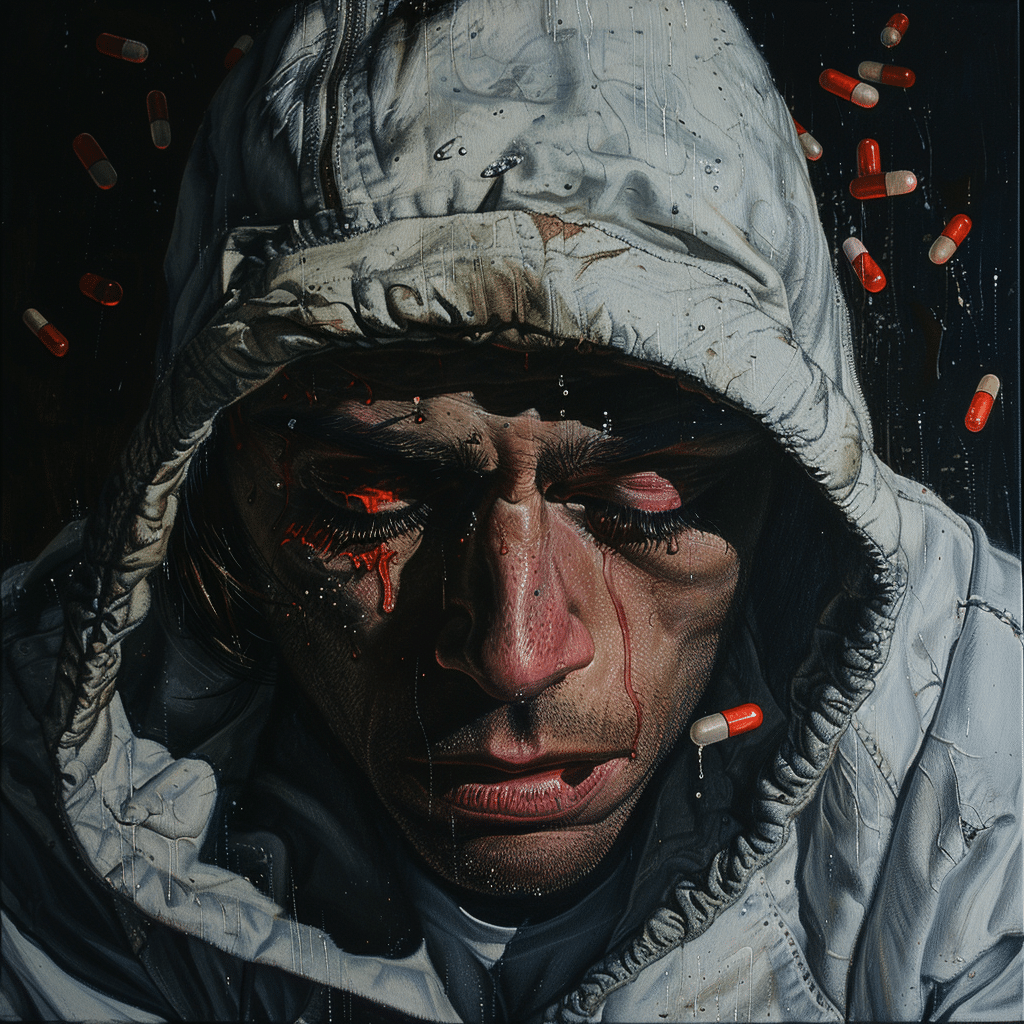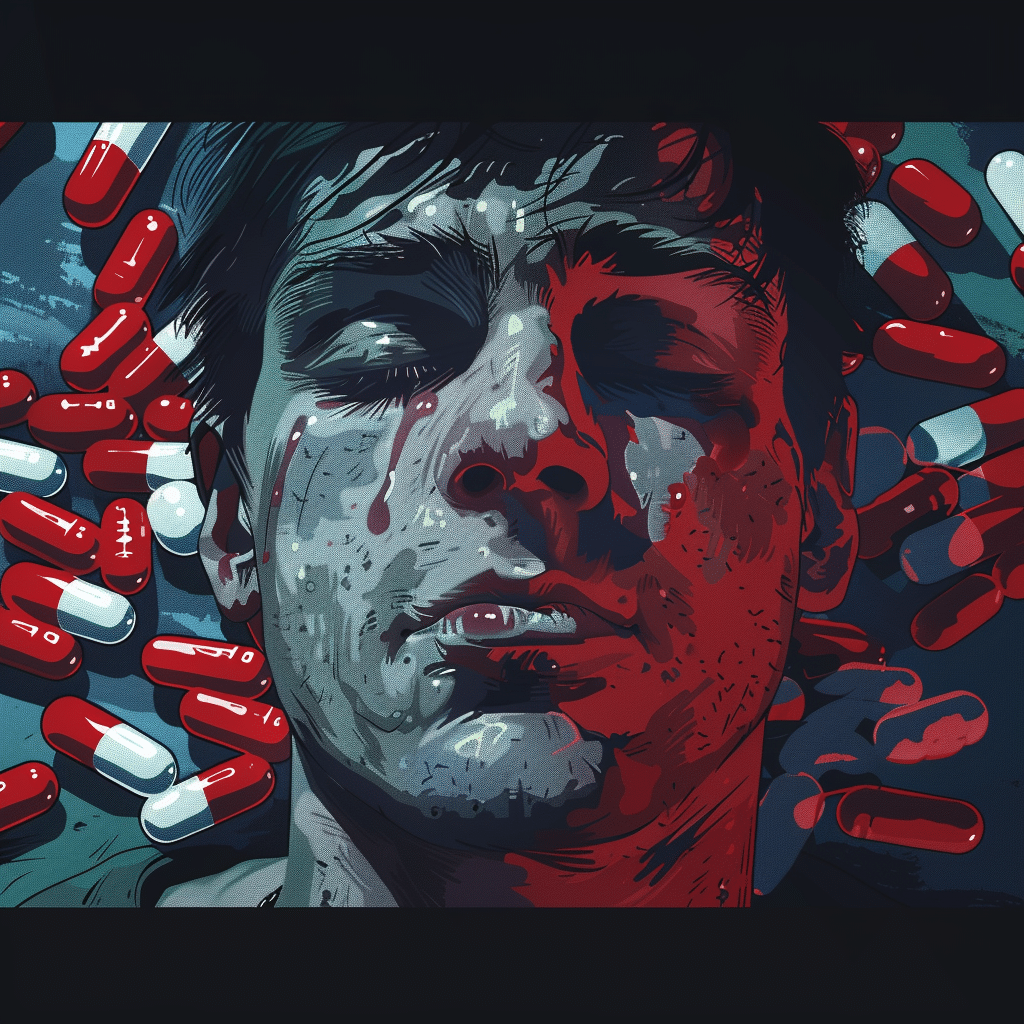The dark alleyways of addiction rarely pave the way for light, but at the end of that tumultuous tunnel lies the potential for renewal and rebirth. Heroin withdrawal is a notorious gatekeeper on this path, one that many fear to approach. As an organization dedicated to helping parents of children struggling with addiction, we at Mothers Against Addiction.org understand how arduous this journey can be—filled with obstacles both physical and emotional. In shedding light on the realities of heroin withdrawal, we strive to offer a hand to those feeling engulfed by the shadows of addiction.
Understanding Heroin Withdrawal and Its Impact on Recovering Addicts
If we’re to talk turkey, heroin withdrawal is no walk in the park. It’s like the body’s thrown into a frenzy without the substance it’s been leaning on for so long. When we say heroin withdrawal, we’re talking about a hellacious ride that can make even the toughest folks wish they’d never laid eyes on the stuff.
Now, y’all might be wondering just how bad it can get. Well, picture this—the discomfort, the aches, that heart-wrenching feeling of need is a pit so deep it feels you might never climb out. It’s the body’s cry for something that, in a cruel twist of fate, is both poison and panacea. And folks, that’s just the beginning of the long road to recovery.

The Gripping Reality of Heroin Detox and Withdrawal Symptoms
Let’s put it bluntly; heroin detox is a beast, and you’ve got to be tenacious to wrestle it down. You know something’s got a mighty hold on you when you’re counting the minutes since your last hit, and those minutes feel like days. Heroin withdrawal symptoms can kick in hard and fast, clawing at you with things like:
It ain’t pretty, but recognizing these symptoms for what they are—a temporary battle for a longer-term peace—is part of girding yourself for the fight.
| **Aspect** | **Details** |
|---|---|
| Definition | Withdrawal is a condition resulting when a person ceases or reduces the intake of an addictive substance. |
| Substance | Heroin – an opioid |
| Acute Withdrawal Onset | Usually begins within 6-12 hours after the last dose. |
| Duration of Acute Withdrawal | Typically peaks within 1-3 days and can last for up to a week. Some symptoms may persist for several weeks. |
| Post-Acute Withdrawal Syndrome (PAWS) | May persist for months, characterized by psychological distress. |
| Common Symptoms | |
| Physical Symptoms | – Trembling and tremors – Muscle pain and aches – Nausea and vomiting – Diarrhea – Sweating – Fever – Runny nose and watery eyes |
| Psychological Symptoms | – Anxiety – Insomnia – Depression – Agitation |
| Appetite-Related Symptoms | – Hunger or loss of appetite |
| Complications | |
| Dehydration | Due to vomiting and diarrhea |
| Sleep Disturbances | Difficulty in falling and staying asleep; nightmares |
| Mental Health Risks | Increased risk of depression and anxiety; suicidal thoughts |
| Overdose Risk post-withdrawal | Lowered tolerance after withdrawal can lead to overdose if heroin is used again. |
| Treatment Approaches | |
| Medication-Assisted Treatment (MAT) | Methadone, buprenorphine, and naltrexone to reduce cravings and withdrawal symptoms |
| Supportive Care | Hydration, nutritional support, and counseling |
| Psychological Support | Therapy, support groups, and stress management techniques |
| Detox Programs | Medically supervised detoxification |
| Inpatient/Outpatient Programs | Structured programs that offer various levels of care depending on severity and needs |
| Aftercare and Relapse Prevention | Ongoing support to maintain sobriety and prevent relapse |
Timeline of Torment: Opioid Withdrawal Symptoms and Timeline
Ever hear about the long road to hell and back? That’s a bit like the opioid withdrawal symptoms and timeline. It’s a fickle fiesta of peaks and valleys, with each person dancing to a different tune. The symptoms often crank up within hours after the last dance with heroin. Fraying nerves and restless nights mesh into a tapestry of torment that can last for what feels like eternity.
And just when you think you’ve got a handle on it, things can roller coaster away from you with symptoms like:
– The shakes that feel like an internal earthquake.
– Pains that riddle your body, leaving you wondering if you’re coming undone.
– Cravings that shout louder than any sense of reason.
But listen up, because there’s light at the end of this tunnel—usually within a week, the physical gnashing starts to let up, and hope begins to peek through the clouds.

The Integrated Approach to Managing Heroin Withdrawal
Alright, here’s where we start talking turkey about kicking the habit. Managing heroin withdrawal isn’t just about gritting your teeth and bearing it. We’re talking about an integrated approach here, one that’s got your back medically, mentally, and every which way. You’ll need the wisdom of a seasoned doc, the understanding of a therapist, and sometimes even the crutch of medication-assisted treatment (MAT) to navigate these choppy waters.
This ain’t no solo mission. It’s a full-on brigade, with support pouring in from all sides—the kind of backing that sternum rubbing might symbolize, a gesture helping stimulate consciousness and gather the strength to fight another day.
Exploring the Crossroads of Heroin and Percocet Withdrawal
Here’s where things get dicey because heroin’s not the only player in this dark drama. Ever heard of Percocet? That little prescription pill can lead you down a path strikingly similar to the heroin highway, with percocet withdrawal being a twin terror you’d rather not meet. Whether it’s a doctor’s script or a street corner score, the withdrawal waltz remains much the same—agonizing, real, and blind to social status.
It’s high time we recognize that the line between medicine and menace is thinner than most realize, and crossing it can lead to a world of hurt.
Personal Stories of Triumph Over Heroin Withdrawal
Now, y’all might need to hear this part most of all. They say experience is the best teacher, and that’s the gospel truth when it comes to busting free from heroin’s hold. Personal tales tell us more than any textbook could—they’re the gritty, gutsy Signs Of heroin use turning into beacons of hope.
You see, real folks like you and me have walked this gauntlet and made it through to the other side. They’ve been through the wringer, come out drenched, but somehow, they found the strength to keep going. Their stories aren’t just diary entries, folks; they’re testaments to resilience, guideposts for those still trudging the rocky road of recovery.
An Innovative Conclusion: Rethinking Recovery in the Wake of Heroin Withdrawal
So, here we stand at the crossroad, having talked some tough truths about heroin withdrawal. Peeling back its layers reveals not just a medical issue, but the heart of what weaves a community together or tears it apart. Overcoming this beast of burden isn’t the finish line; it’s the start of a marathon—a lifelong quest for sobriety.
From the glimmers of hope shared by those brave souls who’ve come before us to the innovations in treatment and support, we’re in a position to rethink how to aid recovery. Every step, every story paves the way for a future where the grip of heroin is but a distant memory, and those green auras of growth and renewal shine bright for all to see.
Remember, as bleak as that withdrawal tunnel might appear, it leads to the light of day. The journey may be fraught with despair at times, but take it from the ones who’ve made it through—they’d tell you every tremble, every sleepless night, is worth it for the life waiting on the other side.
The Gritty Reality of Heroin Withdrawal
Let’s dive into a rollercoaster of facts that unravel the harrowing experience of heroin withdrawal. Buckle up, because much like the intensity of Harry Potter And The Forbidden journey, this journey through the twilight of withdrawal is a real magical mystery tour, except the potions in question are nowhere near as whimsical.
When the Magic Fades
Heroin, that notorious substance, can enchant a person’s brain like a bad spell. But ever wondered How long Does heroin last within the system? It’s kinda like expecting a guest who overstays their welcome – heroin’s effects might seem to waver after a few hours, but it lingers in the body like an awkward silence, making the path to sobriety as tricky as getting a straight answer from a Sphinx.
The Withdrawal Woes: A Wild Ride
Picture this: You’re on an “American Airlines flight”, emotions are soaring high and then—bam!—turbulence. Heroin withdrawal is that jolt, that unexpected bump that leaves every part of you shaken. Symptoms kickstart as early as six hours post your last dose, buckling you up for a ride that’s anything but smooth sailing.
Fentanyl vs. Heroin – The Showdown
Some say that knowledge is power, and when it comes to withdrawal, every tidbit can be a lifeline. Take How long Does fentanyl withdrawal last for example. If heroin withdrawal is a whirlwind romance with misery, fentanyl’s is a long-term relationship gone sour. Both are agonizing, but knowing the timeline can help brace for the battle ahead, like studying your opponent before a duel.
The Withdrawal Symptoms: No Walk in the Park
If withdrawal symptoms were Married at First sight cast members, they’d be the ones you love to hate. Sweats, shakes, and anxiety that not even the most tumultuous reality TV marriage can rival. This ensemble of discomfort doesn’t care about your schedule and can spread out over a week—each day an episode more intense than the last.
Slam Dunking Through the Pain
Withdrawal might seem like an endless game where the hoops are on fire, and you’re expected to score from half-court. But remember Arike Ogunbowale and her epic buzzer-beaters? Victory against heroin can feel just as exhilarating. The key is resilience and support, because every recovery is a championship win.
The Finale: Emerging Victorious
So, there you have it—a sneak-peek into the gnarly world of heroin withdrawal. It’s a test of the human spirit that makes Frodo’s journey to Mount Doom seem like a stroll through The Shire. But just like any harrowing tale, the end can be triumphant with the right allies and a quiver full of determination.
Armed with these facts, we see that recovery is possible. It’s a hero’s journey, a story of conquering inner demons, and a testament to the strength that lies within us all. Let’s champion for those braving this battle and support them to the finish line.

What is one of the first signs of withdrawal?
Oh boy, the first signs of withdrawal can be real doozies, starting with the shakes, right? Picture trembling and tremors like you’re out in the cold with no jacket. You might also feel muscle pain that makes you think you’ve run a marathon, and your stomach can’t decide if it’s hungry or over it—totally kaput. Keep an eye out for these symptoms as early as May 4, 2023!
How do you prevent withdrawal symptoms?
Well, hold your horses! To head off those nasty withdrawal symptoms, your best bet is to buddy up with a healthcare pro for a game plan. This might mean gradually cutting back on the substance, switching to a less potent one, or using medications to ease the transition. Prevention is key, so don’t go it alone!
What is the meaning of withdrawal stage?
Withdrawal stage – that’s the rough patch when your body’s yelling, “Hey, where’d my usual dose go?” It’s a bit like a cranky toddler missing their favorite toy. It’s the time when folks experience all sorts of physical and mental symptoms that hit them like a ton of bricks after saying “no more” to an addictive substance.
Which withdrawal signs and symptoms would the nurse assess for in a recently hospitalized client with an opioid use disorder?
For our pals recently parked in the hospital with opioid use disorder, nurses are on high alert for a specific set of symptoms. They’ve got their eyes peeled for clients shaking like a leaf, aching all over, and either starving or unable to even look at food. They know the drill and keep a close watch!
What is the most serious form of withdrawal?
Now we’re talking serious business. The most serious withdrawal? That’s the dreaded beast called delirium tremens (DTs), usually tied to alcohol. This bad boy can cause confusion, rapid heartbeat, and even seizures that have you acting all kinds of crazy—it’s not for the faint of heart!
What are the 6 types of withdrawals?
Six types of withdrawals, huh? Well, you’ve got your classics like alcohol, opiate, and nicotine. Don’t forget the stimulants, benzodiazepines, and even cannabis — yep, that too! Each one’s got its own brand of misery, with symptoms to match.
Does everyone get withdrawal symptoms?
Does everyone join the withdrawal pity party? Nope, it’s not a one-size-fits-all deal. While many do ride the struggle bus when quitting an addictive substance, some lucky ducks might just waddle away with nary a symptom. It’s like dodging a bullet!
What are the withdrawal symptoms produced by abstaining from a drug?
If you’re ditching a drug, withdrawal symptoms can sneak up on you in all shapes and sizes—shakes, aches, hankerings for a snack, or zero appetite. Like your body’s throwing a tantrum because you’ve cut off its candy supply!
What’s the difference between withdraw and withdrawal?
Trying to figure out ‘withdraw’ and ‘withdrawal’? Here’s the skinny: ‘withdraw’ is the verb, like “I’m gonna withdraw from this coffee craze.” As for ‘withdrawal,’ it’s the noun—think of it as the aftermath party, with all the glitchy physical and mental symptoms your body throws your way.
How long does a withdrawal take?
Curious about the withdrawal timeline? It’s like waiting for paint to dry— it can drag. Symptoms might show up within hours or days and stick around for days to weeks, sometimes even longer. It’s not exactly a quick trip, more like a long, bumpy road.
What is the path of withdrawal?
The path of withdrawal? It’s a rollercoaster with ups and downs. Starting with the decision to quit, it winds through early symptoms, peaks with some pretty intense cravings and mood swings, and if you’re toughing it out without help, let’s just say you’re in for a bumpy ride.
What are the behaviors of withdrawal?
Withdrawal behaviors? Think hermit mode. Some folks pull a disappearing act, avoiding people like they’re selling something. They might get snappy or seem down in the dumps, pretty much like they’ve lost their last friend.
What medications should not be stopped abruptly?
Don’t even think about slamming the brakes on certain meds without talking to your doc—that’s asking for trouble. Serious meds like antidepressants, blood pressure pills, and anti-seizure drugs need a slow fade, or else your body’s going to throw a major fit.
What is Suboxone used for?
Suboxone, you ask? It’s like the Swiss Army knife for kicking opioid addiction—part pain reliever, part blocker. It’s designed to cut the cravings and make withdrawal feel like less of a monster to battle with.
What are some examples of withdrawal symptoms and when do they occur?
Examples of withdrawal symptoms? You’ll see the usual suspects: shaking, sweating, feeling all out of sorts, and a serious case of the munchies—or none at all. This party typically starts within hours to a couple of days after the last dose, so brace yourself.
Where does withdrawals appear?
Where do withdrawals appear? Well, not at the disco, that’s for sure! These symptoms show up in the body and mind of someone who’s cut ties with an addictive substance. Think of them like uninvited guests at your front door.
What are the symptoms of withdrawn behavior?
Withdrawn behavior symptoms? It’s like somebody switched off the lights. You might see someone pulling a vanishing act, getting all quiet and moody, or simply losing the spring in their step. Like they’ve lost their zest for life, you know?
Can you feel sick when detoxing?
Oh, detoxing—sounds all healthy and zen until you’re knee-deep in it, right? You betcha, you can feel like you’re on the losing end of a boxing match. Nausea, headaches, feeling like a truck ran you over—it’s all part of the bargain when your body’s scrubbing out the gunk.




























